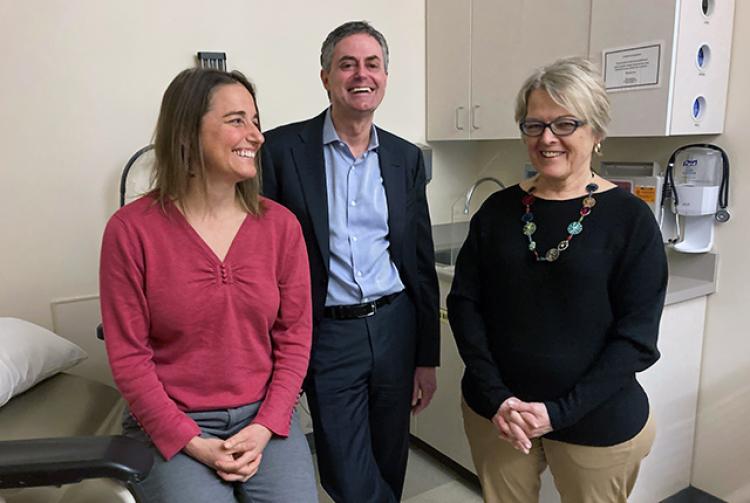
From left, Drs. Jacqueline Raetz and Barak Gaster used funding obtained by Annette Fitzpatrick to develop the Cognition in Primary Care program. Credit: Brian Donohue / UW Medicine
By Brian Donohue, UW Medicine Newsroom
U.S. healthcare systems face a crisis of being woefully unable to provide it adequately for the next two decades. Primary-care clinicians say they need more training in it. Patients really want to talk about it with their trusted medical advisers.
“It” is the diagnosis and care of dementia, whose U.S. incidence is forecast to more than double by 2050. Such a case volume is far beyond what could be managed by specialists in this area, typically neurologists and geriatricians.
Dr. Barak Gaster is building a program to help healthcare systems meet this colossal need. While maintaining a busy primary-care practice, the UW Medicine physician has spent the past seven years learning all he can about dementia: red flags, diagnostics, how to talk with patients and families, and treatment options.
The result of this immersion is “Cognition in Primary Care,” which Gaster describes as a “simple, easy-lift intervention” that first-line clinicians critically need.
“I think they increasingly realize they need a better skill set for dementia,” he says. “Your primary-care doctor has the understanding and tools to ask smart questions in most areas, but many feel like they need more knowledge, more confidence and better tools when a patient says, ‘I might be having memory problems.’ ”
Diagnosing and treating dementia was barely taught about 20 years ago when Gaster was in med school. Although this is starting to change, he said, generations of clinicians in practice are unprepared to respond to the surging wave of patient need, which motivates him to get dementia-focused training to them.
The Cognition in Primary Care program blends brief education modules with easy-to-use electronic health record tools to put the training into practice. With government funding obtained by epidemiologist and researcher Annette Fitzpatrick, Gaster and colleague Jacqueline Raetz, a family physician, wove clinical best practices into an approach that feasibly fits with the many other tasks that rain on the primary-care umbrella.
UW Medicine has offered the course to all of its primary-care clinicians across greater Seattle. One early adopter was Dr. Nina Maisterra.
“It’s user-friendly, which I think is because these (content creators) are people who understand that our day-to-day job leaves us about 10 minutes to learn something new,” Maisterra said.
The content, she said, was broken into three digestible parts:
- identifying patients at risk, screening for red flags and modifying risk factors
- testing in more detail to establish a diagnosis, and providing a referral if appropriate
- offering follow-up treatment, support and ongoing surveillance, in primary care or with neurology
Maisterra also cited the value of having program-focused shortcuts embedded in the Epic (electronic medical record) system.
“Until it became muscle memory,” she said, “it was great to refer to dot phrases they built. In primary care, we don’t usually get content that’s this user-friendly.”
In her first few patient cases following the new cognitive-care protocol, Maisterra had more confidence, she said.
“It felt so good to have this information instead of thinking, ‘How do I handle this?’ or just write a referral. I had been using a screening tool to kind of improvise. It was fine, but having a more validated approach was very helpful.”
One case involved a familiar patient, a woman in her late 60’s, whose family expressed concern about her memory lapses.
“We went through this process, the questionnaires and the testing and the follow-up visits. She ended up not having (a diagnosis of cognitive impairment), which of course was a relief for them, but based on our conversations, we got her hearing aids updated and eliminated some medications for other issues that might have been contributing to her cognitive symptoms. And she had lapsed on using her CPAP (for sleep), so we got that going again, and she cut down on her alcohol use,” Maisterra said. “When I saw her back, she was feeling a lot better.”
She added, “This is someone who benefited from a primary-care visit that happened sooner instead of having to wait months, maybe, to get on a specialist’s schedule.”
It’s an example of the offloading that Gaster envisions with this program.
“This is not replacing specialty care — I want to be clear on that. But it is partnering better with specialty care. It’s just better care.”
Clinicians interested to learn more about the program can visit Cognition-PrimaryCare.org.




